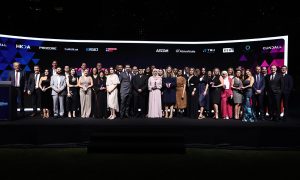Women in Construction: Faithful+Gould’s Emma Woods
“The more females we have progressing through the industry and reaching higher levels of management, the more role models there will be”

“The mark I have left on the industry is due to the hard work and effort I put into it. I don’t necessarily think this is due to the fact I am a woman…”
As part of the Women in Construction series, Faithful+Gould’s Emma Woods says diversity in the GCC construction sector is increasing…
What drove you to get into construction and your very first role in the industry? What were some of the influences that set you on your path?
I didn’t study surveying or anything construction related at university. When I graduated, I didn’t really have a clear idea of what I wanted to do as a career. Whilst living in London I met a friend for a coffee who had just started on the graduate training programme for a large construction consultancy. It was the first time I’d heard about the role of a quantity surveyor (QS). Interested in the opportunities such a career offered, I managed to successfully gain a position on a similar graduate training scheme, where I was supported through my conversion course in QS. Being a ‘non-cognate’ I had lot of catching up to do, however studying, whilst working, although hard at times, was certainly beneficial in the long run.
Tell us about your career, mentioning key milestones.
My career started in London as a graduate at a leading construction consultancy. This was a great city to begin my career and there were many graduates within the organisation who were a good support network. Following a number of years in London, I managed to secure a transfer to the company’s Sydney office, where I continued to grow my project experience. The next stop was Dubai, where I have been ever since and have grown to the level of associate director. During my time in Dubai, I have developed a network of clients and have been heavily involved with the Royal Institution of Chartered Surveyors (RICS).
What would you say is the proudest moment in the industry?
The mark I have left on the industry is due to the hard work and effort I put into it. I don’t necessarily think this is due to the fact I am a woman, it is due to the fact I have an extremely strong work ethic and have challenged myself to achieve target career goals.
What are some of the barriers to women entering the construction industry? What was your personal experience?
Based on my experience, I don’t think there are any ‘barriers’ as such for women entering the industry, however, certainly when I was at school, there was no career advice provided relating to construction, and therefore it wasn’t a consideration when entering higher education. I’m sure times have changed but I certainly think more awareness needs to be brought to schools and colleges of the what this industry is and perhaps more importantly, what it isn’t, so a more diverse array of people consider it as a promising career.
The GCC construction sector is still male dominated, however diversity is beginning to increase. If you agree with the above line, comment on what is driving this and how you see the GCC markets changing in the coming years? If you do not agree with the first line of this question, please share your thoughts/views of the market.
We are seeing a larger portion of females entering the industry, across contractors, clients and consultants. This is due to both more awareness of the various roles on offer in the construction industry whilst at school/university and also the increased accessibility and variety of degrees available. The more females we have progressing through the industry and reaching higher levels of management, the more role models there will be for young females can relate and aspire to.
Everyone has a part to play in diversity and equal pay. What would you like to see government authorities and construction firms do to increase diversity and make pay a level playing field?
I personally haven’t witnessed any pay discrepancies within the industry, however that’s not to say it doesn’t exist.
As a woman in the industry, what has your experience been working in the GCC construction sector? If you have worked in markets outside the GCC, how does your experience here compare with what you’ve experienced and observed in other markets?
My experience during the past decade in the Middle East has been extremely positive. I have had the opportunity to work with people from a diverse mix of backgrounds, and I’ve really gained an insight into what makes people from other cultures tick. I have previously worked in both the UK and Australia and from a female point of view, I do not see working in the Middle East any more challenging.
What is the biggest challenge women in the construction sector face in GCC countries? How can these challenges be addressed?
As stated above, I think the level of maternity provisions in local labour law (as well as the absence of any paternity leave provision) create challenges for working parents. Combined with the long working hours, it can be difficult to fulfill your childcare needs, while maintaining your career goals. As the economy and market here matures and positions in the GCC are seen as long-term options, I definitely think more flexibility needs to be provided to the working parents who need it.
In doing your job, what sort of discrimination (if any) have you faced and how did Faithful+Gould address it?
I have never faced any discrimination by any employer or client I have worked with.
Do you feel there’s a limit with regards to how far you can progress within your respective organisation?
To be honest, no. Your career is what you make of it. As with a lot of organisations, there are a limited number of females in higher management positions. I don’t have the definitive answer as to why that is, possibly due to the lack of numbers who entered the industry in the past, maybe due to some females not being able to return to the industry after starting a family; however, I do hope this trend will see a greater shift in the future.
How does the firm you currently work for approach diversity in the workplace? What more can your firm do to increase diversity?
The business took a major step forward in 2016 in its goal to become employer of choice for women in the Middle East, after being the first construction consultancy to change its maternity policy to allow up to 14 weeks’ paid maternity leave. Its introduction was spearheaded by the Middle East Women’s Business Network (WBN), which was established by Faithful+Gould and Atkins to develop a corporate environment, which will better enable women to achieve long term careers in the industry.
Our female employees are entitled to maternity leave with full pay for up to 14 weeks, including both pre and postnatal periods. Thereafter, they will also be entitled to take up to six months unpaid maternity leave, with the option of taking paid Keeping in Touch (KIT) days to remain in contact with their teams.
What advice would you give to a woman entering the GCC construction industry today?
Don’t focus too much on the fact you are a female. The fact that you are a female is irrelevant when working in the construction industry. It’s what you put into your career that is generally the measure of what you’ll get out of it. If you get too caught up in the clichés of being a female in a male dominated industry, your energies will be focused in the wrong place. Enjoy it and if you do face any discrimination of any sort, shout.
To support the drive towards gender balance in the industry, Middle East Consultant and meconstructionnews.com are highlighting female construction professionals in a series of profiles and by gaining from their insight. By telling their stories and sharing their experiences on our print and digital platforms, we hope to inspire more women to join this vibrant industry.

























